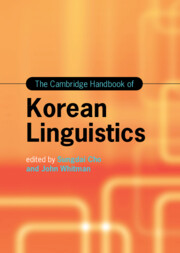Book contents
- The Cambridge Handbook of Korean Linguistics
- Cambridge Handbooks in Language and Linguistics
- The Cambridge Handbook of Korean Linguistics
- Copyright page
- Contents
- Figures
- Tables
- Contributors
- Preface
- Acknowledgments
- Abbreviations
- Part I Korean Overview
- Part II Phonetics and Phonology
- Part III Morphology and Syntax
- Part IV Semantics and Pragmatics
- Part V Sociolinguistics and Psycholinguistics
- Chapter 23 Grammaticalization in Korean
- Chapter 24 Performing Gender in Korean: Language, Gender, and Social Change
- Chapter 25 Jejueo: Korea’s Other Language
- Part VI Language Pedagogy
- Index
- References
Chapter 25 - Jejueo: Korea’s Other Language
from Part V - Sociolinguistics and Psycholinguistics
Published online by Cambridge University Press: 30 September 2022
- The Cambridge Handbook of Korean Linguistics
- Cambridge Handbooks in Language and Linguistics
- The Cambridge Handbook of Korean Linguistics
- Copyright page
- Contents
- Figures
- Tables
- Contributors
- Preface
- Acknowledgments
- Abbreviations
- Part I Korean Overview
- Part II Phonetics and Phonology
- Part III Morphology and Syntax
- Part IV Semantics and Pragmatics
- Part V Sociolinguistics and Psycholinguistics
- Chapter 23 Grammaticalization in Korean
- Chapter 24 Performing Gender in Korean: Language, Gender, and Social Change
- Chapter 25 Jejueo: Korea’s Other Language
- Part VI Language Pedagogy
- Index
- References
Summary
Chapter 25 offers a survey of Jejueo (Cheju-ŏ), with a focus on two major issues. The first is the status of Jejueo and whether it deserves to be classified as a dialect of Korean, consistent with long-standing practice. Based on a test of its intelligibility to monolingual speakers of Korean, the chapter concludes that Jejueo is in fact a distinct language and deserves to be recognized as such. This finding leads to the question of how Jejueo differs in its phonology and morphosyntax from Korean. Drawing on the extensive treatment of this subject in the authors’ book, Jejueo: The Language of Korea’s Jeju Island (University of Hawaii Press, 2019), the chapter examines the salient features of its phonological patterns, its inventory of nominal particles, and its system of verbal inflection.
Keywords
- Type
- Chapter
- Information
- The Cambridge Handbook of Korean Linguistics , pp. 717 - 748Publisher: Cambridge University PressPrint publication year: 2022
References
- 1
- Cited by

